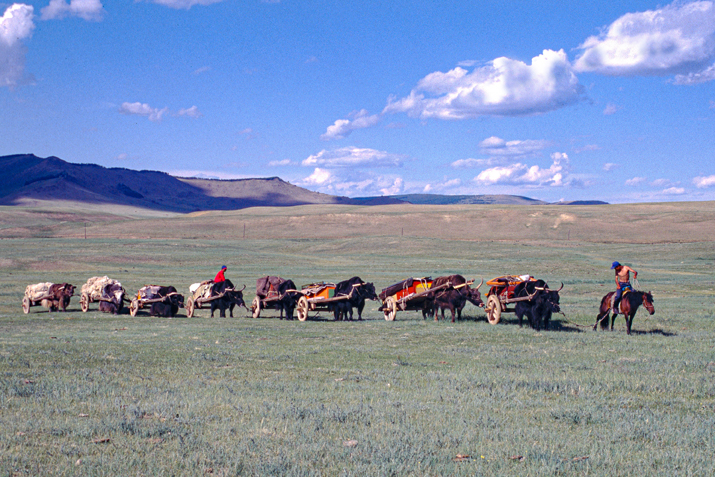
Crossed to be shod
N 49°00'658'' E 103°16'608''
Day: 42-43
Sunrise:
06:26/06:28
Sunset:
7:45 pm/19/43
Total kilometers:
504
Soil condition:
Meadow
Temperature – Day (maximum):
20 °C
Temperature – day (minimum):
10 °C
Temperature – Night:
minus 8 °C
Latitude:
49°00’658”
Longitude:
103°16’608”
Maximum height:
1340 m above sea level
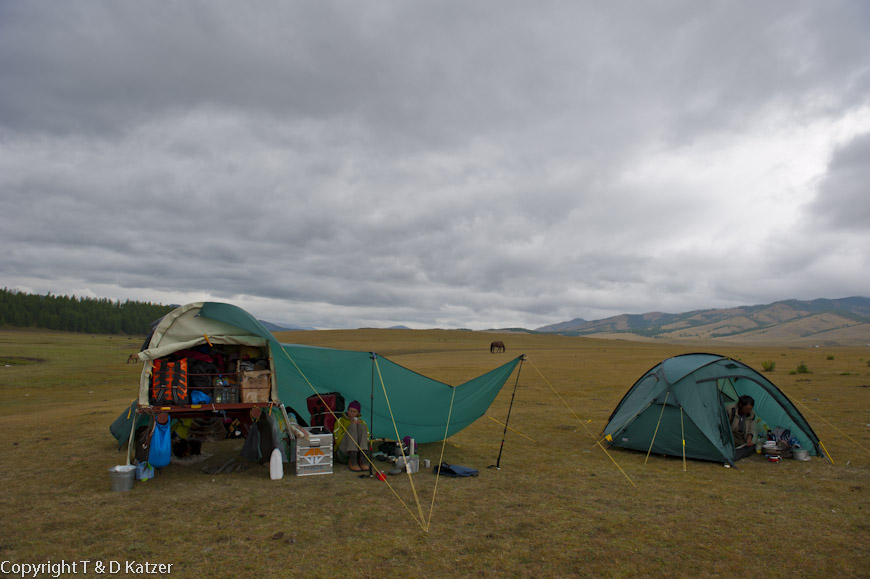

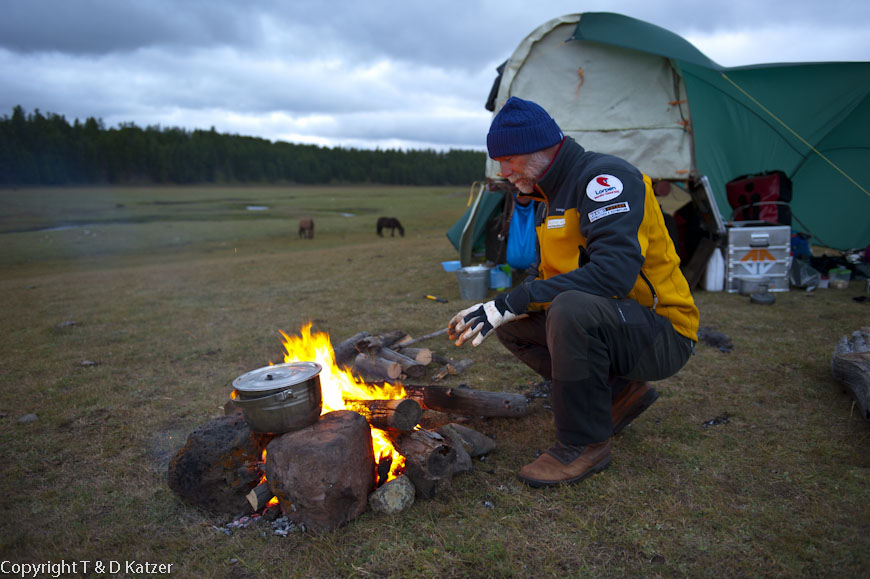

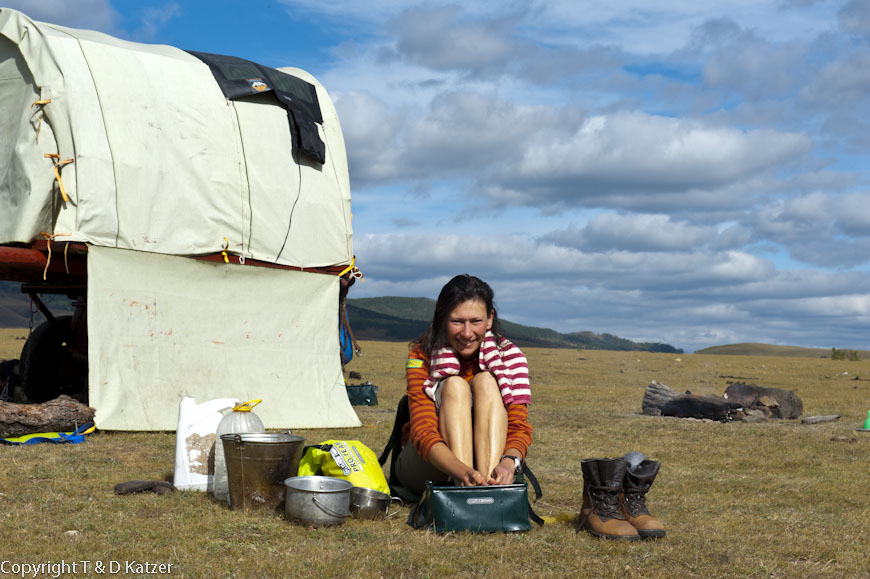

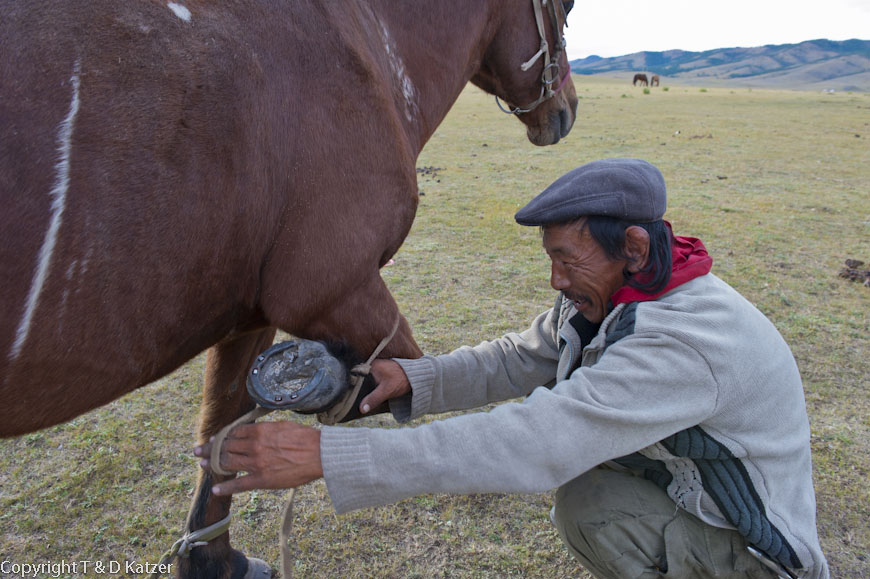
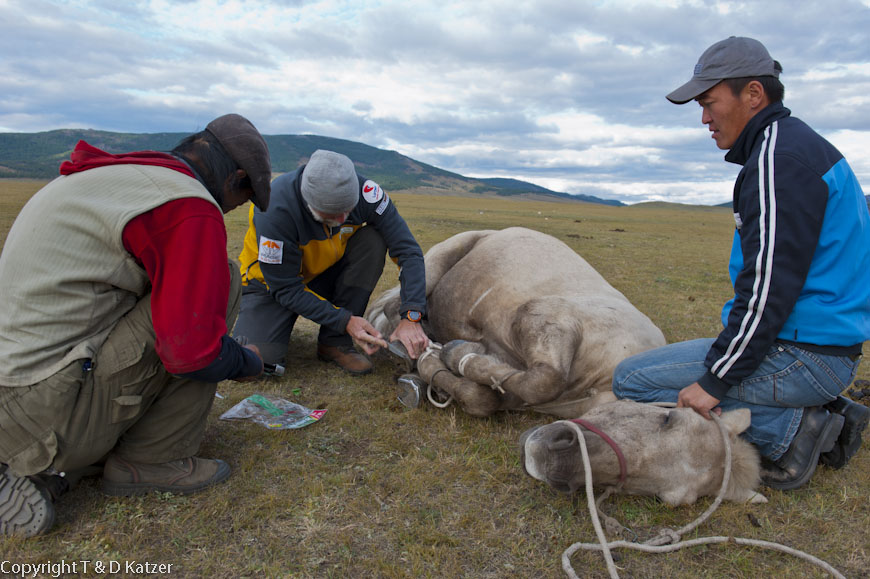
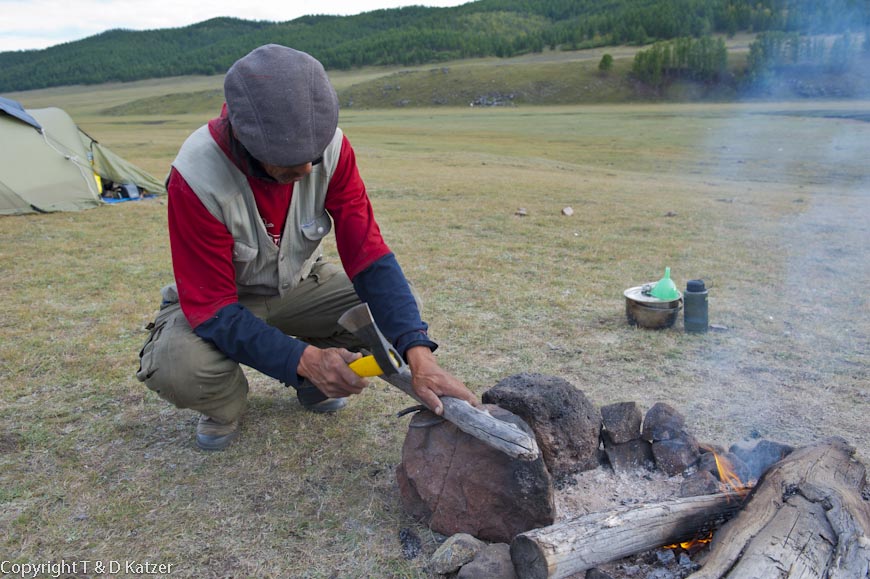
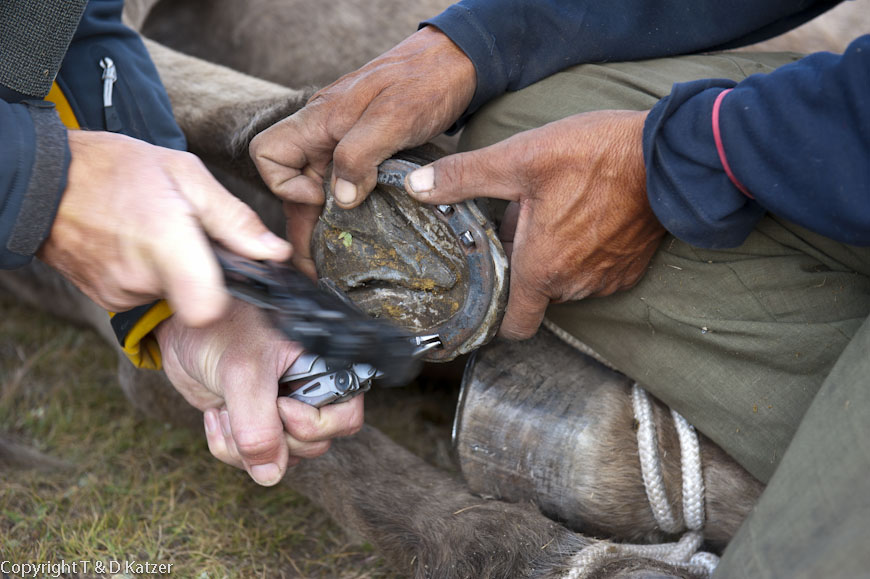
After a cold night, we are greeted by a cold, rainy and windy day. I try to write under my canopy, which I have pulled off the horse-drawn cart. However, this proves to be impossible due to the strong and cold wind. Later, I retire to the tent to continue my work. Huddled together, I’m hitting the keys here. Outside, however, it is becoming increasingly uncomfortable. The temperatures have dropped to a good 10 degrees. As it gets dark, the cold really starts to bite us. During my night shift, which I use to formulate these texts, my fingers hurt. Then Tanja takes over from me. Mogi starts barking without interruption. He has discovered something in the forest on the other side of the river to fall into Rasche. Cursing, I rush out of the tent again to stop him from barking so stupidly. Mogi looks at me as if I were the one who had been bitten by the wild monkey and not him. Then I stretch another tarpaulin on the forest side of the horse-drawn wagon and place a few duffel bags in the still open viewing holes. “So my friend”, now it is impossible for you to bark at any spirits. Let’s finally go to sleep,” I say, whereupon he lies down on his sheepskin that Bilgee gave him.
Then I slip into my sleeping bag, shivering with cold and unable to get warm. Although it is only minus eight degrees outside and our sleeping bags are rated for minus 20 degrees, we are freezing. I pull the head section of the sleeping bag up to the size of my fist to keep out the icy air. But my nose still feels like an icicle. Your feet don’t get warm either. I huff my breath into my sleeping shell until I can hardly breathe and then take in some of the cold air again. It often goes on like this until the morning. Then, when the first rays of sunshine shine on the tent skin, it finally gets warmer. But this soothing warmth is not permanent. It quickly becomes unbearably warm in our dwelling, so we leave it. An icy north wind is blowing outside. When the sun disappears behind the clouds, the thermometer drops from 20 to 8 degrees. We constantly have to put on or take off jackets. Temperatures change constantly at this time of year. So we can still look forward to warm days and hours. Soon, however, this change will no longer exist and the great Mongolian cold that everyone talks about here will dominate the day and night.
“Denis, can you give us the horseshoes please? Bilgee and I are going to shoe Bor now!” shouts Ulzii. “I’m coming!” I reply, close my laptop and leave the tent. Bilgee has hobbled boron on the two front feet and one hind foot. I look at the right front hoof and notice that it has become uneven and needs to be filed. About two months ago, Bert, a friend of ours, showed us how to hoof horses professionally. I would never have believed that the moment would come when I would have to apply this knowledge. Bilge cuts the deformed hoof into shape with the iron and wood saw. If a German farrier were to see this, the hairs on the back of his neck would stand up. But with our limited resources out here in the wilderness, it’s a possibility that works. Then we try to fit one of the horseshoes to the horse’s hoof. Bilgee hammers the bent part into shape on a stone. Then he binds the horse’s shod foot upwards so that it only stands on three legs. I take one of the nails the carters have given us and try to hammer it into the hoof with Bert’s outdoor tool. It bends immediately. “I’ll get Bert’s nails,” I say and then put on one of the shiny silver horseshoe nails. “What was that again?”, I think, because I remember that the hoof nail has to be set at an angle so that it comes out on the outside of the hoof and doesn’t penetrate too deeply into the horse’s hoof. “It’s working,” I say happily as the nail tip actually appears where it should after a few strokes. Boron is quickly steamed up. “Super,” I say, delighted with the success. Bilgee also seems relieved. We shake hands and laugh at each other. “Now we’re doing sharga,” he says confidently. “Sharga? But that will be a dangerous undertaking,” I object. “Bilgee will lay him on his side and tie his legs,” Ulzi reassures me. “Put it on the side?” “Yes.” “Well then, let’s kill the biter and the bruiser,” I reply, curious to see how they’re going to do it. Bilgee ties the two front feet to one of the animal’s hind feet and pulls on the rope while Ulzi pulls on the halter and I push the horse’s hindquarters to the side. Although Sharga fights back with wide eyes, he falls over on his side like a felled tree. Bilgee now ties up all four feet so that we can work on his hind feet without danger. “Look at that. Another day and he would have lost the second hoof too,” I say, pointing to the loose hoof nail. I pull it out and hammer in a new brad nail. “Fits”, we are pleased. We then shoe the missing hoof with a new shoe in a reinforced manner. Sharga snorts pitifully, but that’s the only way we can give him a new horseshoe without being sent to the afterlife. 20 minutes later, this job is also successfully completed.
After dragging in old wood from the surrounding abandoned yurt camps yesterday to light a crackling campfire, the scarce gas and fuel reserves have eased. Bilgee and Ulzii took the initiative to get more wood from the nearby forest. Now, after the hard work of blacksmithing, Bilgee puts more wood on the fire to prepare a hearty meal. The mood is cheerful despite the low temperatures. Because Bilgee only spent the night under his Deel and Ulzi only has a thin summer sleeping bag, they both froze terribly again last night. “I’ll give them the three new horse blankets,” I say and get them out of our car. “Thank you very much,” our companions say happily. If the temperatures continue to fall in the coming weeks, we will definitely have to think of a way to keep Bilgee and Ulzii alive. Their morale is essential for the survival of our expedition. They must not freeze too much otherwise they will lose the joy of the journey and the sense of purpose.
Mongolia/Horse Camp – 05.09.2011 – 06.09.2011
After a cold night, we are greeted by a cold, rainy and windy day. I try to write under my canopy, which I have pulled off the horse-drawn cart. However, this proves to be impossible due to the strong and cold wind. Later, I retire to the tent to continue my work. Huddled together, I’m hitting the keys here. Outside, however, it is becoming increasingly uncomfortable. The temperatures have dropped to a good 10 degrees. As it gets dark, the cold really starts to bite us. During my night shift, which I use to formulate these texts, my fingers hurt. Then Tanja takes over from me. Mogi starts barking without interruption. He has discovered something in the forest on the other side of the river to fall into Rasche. Cursing, I rush out of the tent again to stop him from barking so stupidly. Mogi looks at me as if I were the one who had been bitten by the wild monkey and not him. Then I stretch another tarpaulin on the forest side of the horse-drawn wagon and place a few duffel bags in the still open viewing holes. “So my friend”, now it is impossible for you to bark at any spirits. Let’s finally go to sleep,” I say, whereupon he lies down on his sheepskin that Bilgee gave him.
Then I slip into my sleeping bag, shivering with cold and unable to get warm. Although it is only minus eight degrees outside and our sleeping bags are rated for minus 20 degrees, we are freezing. I pull the head section of the sleeping bag up to the size of my fist to keep out the icy air. But my nose still feels like an icicle. Your feet don’t get warm either. I huff my breath into my sleeping shell until I can hardly breathe and then take in some of the cold air again. It often goes on like this until the morning. Then, when the first rays of sunshine shine on the tent skin, it finally gets warmer. But this soothing warmth is not permanent. It quickly becomes unbearably warm in our dwelling, so we leave it. An icy north wind is blowing outside. When the sun disappears behind the clouds, the thermometer drops from 20 to 8 degrees. We constantly have to put on or take off jackets. Temperatures change constantly at this time of year. So we can still look forward to warm days and hours. Soon, however, this change will no longer exist and the great Mongolian cold that everyone talks about here will dominate the day and night.
“Denis, can you give us the horseshoes please? Bilgee and I are going to shoe Bor now!” shouts Ulzii. “I’m coming!” I reply, close my laptop and leave the tent. Bilgee has hobbled boron on the two front feet and one hind foot. I look at the right front hoof and notice that it has become uneven and needs to be filed. About two months ago, Bert, a friend of ours, showed us how to hoof horses professionally. I would never have believed that the moment would come when I would have to apply this knowledge. Bilge cuts the deformed hoof into shape with the iron and wood saw. If a German farrier were to see this, the hairs on the back of his neck would stand up. But with our limited resources out here in the wilderness, it’s a possibility that works. Then we try to fit one of the horseshoes to the horse’s hoof. Bilgee hammers the bent part into shape on a stone. Then he binds the horse’s shod foot upwards so that it only stands on three legs. I take one of the nails the carters have given us and try to hammer it into the hoof with Bert’s outdoor tool. It bends immediately. “I’ll get Bert’s nails,” I say and then put on one of the shiny silver horseshoe nails. “What was that again?”, I think, because I remember that the hoof nail has to be set at an angle so that it comes out on the outside of the hoof and doesn’t penetrate too deeply into the horse’s hoof. “It’s working,” I say happily as the nail tip actually appears where it should after a few strokes. Boron is quickly steamed up. “Super,” I say, delighted with the success. Bilgee also seems relieved. We shake hands and laugh at each other. “Now we’re doing sharga,” he says confidently. “Sharga? But that will be a dangerous undertaking,” I object. “Bilgee will lay him on his side and tie his legs,” Ulzi reassures me. “Put it on the side?” “Yes.” “Well then, let’s kill the biter and the bruiser,” I reply, curious to see how they’re going to do it. Bilgee ties the two front feet to one of the animal’s hind feet and pulls on the rope while Ulzi pulls on the halter and I push the horse’s hindquarters to the side. Although Sharga fights back with wide eyes, he falls over on his side like a felled tree. Bilgee now ties up all four feet so that we can work on his hind feet without danger. “Look at that. Another day and he would have lost the second hoof too,” I say, pointing to the loose hoof nail. I pull it out and hammer in a new brad nail. “Fits”, we are pleased. We then shoe the missing hoof with a new shoe in a reinforced manner. Sharga snorts pitifully, but that’s the only way we can give him a new horseshoe without being sent to the afterlife. 20 minutes later, this job is also successfully completed.
After dragging in old wood from the surrounding abandoned yurt camps yesterday to light a crackling campfire, the scarce gas and fuel reserves have eased. Bilgee and Ulzii took the initiative to get more wood from the nearby forest. Now, after the hard work of blacksmithing, Bilgee puts more wood on the fire to prepare a hearty meal. The mood is cheerful despite the low temperatures. Because Bilgee only spent the night under his Deel and Ulzi only has a thin summer sleeping bag, they both froze terribly again last night. “I’ll give them the three new horse blankets,” I say and get them out of our car. “Thank you very much,” our companions say happily. If the temperatures continue to fall in the coming weeks, we will definitely have to think of a way to keep Bilgee and Ulzii alive. Their morale is essential for the survival of our expedition. They must not freeze too much otherwise they will lose the joy of the journey and the sense of purpose.
We look forward to your comments!

